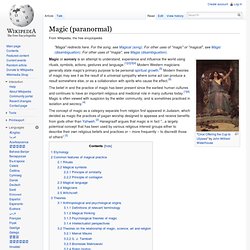

Psychic vampire. Alternate terms[edit] Terms used to describe the substance or essence that psychic vampires take or receive from others include: energy,[1] qi (or ch'i), life force, prana,[1] and vitality.
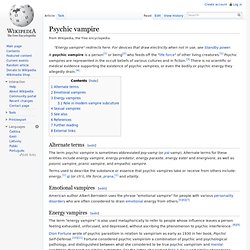
Emotional vampires[edit] American author Albert Bernstein uses the phrase "emotional vampire" for people with various personality disorders who are often considered to drain emotional energy from others.[5][6][7] Adept. An adept is an individual identified as having attained a specific level of knowledge, skill, or aptitude in doctrines relevant to a particular author or organization.

Etymology[edit] The word "adept" is derived from Latin adeptus 'one who has attained' (the secret of transmuting metals).[1] Authors[edit] H. P. Although Madame Blavatsky makes liberal use of the term adept in her works[2] to refer to their minor function as caretaker of ancient occult knowledge. Chaos magic. The chaosphere is a popular symbol of chaos magic.
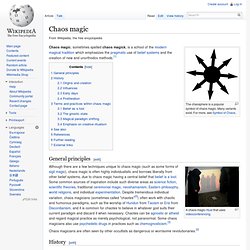
Many variants exist. For more, see Symbol of Chaos. General principles[edit] Chaos magicians are often seen by other occultists as dangerous or worrisome revolutionaries.[2] Hermetic Order of the Golden Dawn. The three founders, William Robert Woodman, William Wynn Westcott, and Samuel Liddell MacGregor Mathers were Freemasons and members of Societas Rosicruciana in Anglia (S.R.I.A.).[5] Westcott appears to have been the initial driving force behind the establishment of the Golden Dawn.
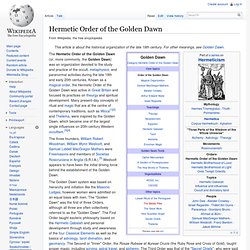
The Golden Dawn system was based on hierarchy and initiation like the Masonic Lodges; however women were admitted on an equal basis with men. The "Golden Dawn" was the first of three Orders, although all three are often collectively referred to as the "Golden Dawn". The First Order taught esoteric philosophy based on the Hermetic Qabalah and personal development through study and awareness of the four Classical Elements as well as the basics of astrology, tarot divination, and geomancy. The Second or "Inner" Order, the Rosae Rubeae et Aureae Crucis (the Ruby Rose and Cross of Gold), taught proper magic, including scrying, astral travel, and alchemy. European witchcraft. Wicca. This pentacle, worn as a pendant, depicts a pentagram, or five-pointed star, used as a symbol of Wicca by many adherents.
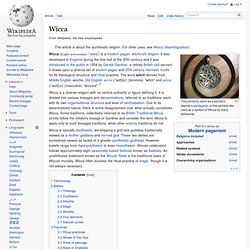
Wicca is a diverse religion with no central authority or figure defining it. It is divided into various lineages and denominations, referred to as traditions, each with its own organisational structure and level of centralisation. Due to its decentralized nature, there is some disagreement over what actually constitutes Wicca. Some traditions, collectively referred to as British Traditional Wicca, strictly follow the initiatory lineage of Gardner and consider the term Wicca to apply only to such lineaged traditions, while other eclectic traditions do not.
Hermeticism. Not to be confused with Hermit.
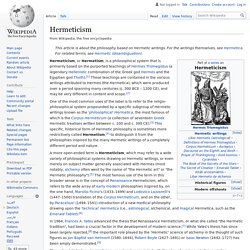
Hermeticism, also called Hermetism,[1][2] is a religious and philosophical/esoteric tradition based primarily upon writings attributed to Hermes Trismegistus ("Thrice Great").[3] These writings have greatly influenced the Western esoteric tradition and were considered to be of great importance during both the Renaissance[4] and the Reformation.[5] The tradition claims descent from a prisca theologia, a doctrine that affirms the existence of a single, true theology that is present in all religions and that was given by God to man in antiquity.[6][7] Magic carpet. A magic carpet, also called a flying carpet, is a legendary carpet that can be used to transport persons who are on it instantaneously or quickly to their destination.
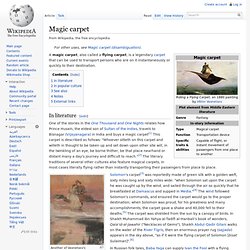
In literature[edit] One of the stories in the One Thousand and One Nights relates how Prince Husain, the eldest son of Sultan of the Indies, travels to Bisnagar (Vijayanagara) in India and buys a magic carpet[1] This carpet is described as follows: "Whoever sitteth on this carpet and willeth in thought to be taken up and set down upon other site will, in the twinkling of an eye, be borne thither, be that place nearhand or distant many a day's journey and difficult to reach. "[2] The literary traditions of several other cultures also feature magical carpets, in most cases literally flying rather than instantly transporting their passengers from place to place.
Another of Vasnetsov's renderings of the same subject. Runic magic. In medieval sources, notably the Poetic Edda, the Sigrdrífumál mentions "victory runes" to be carved on a sword, "some on the grasp and some on the inlay, and name Tyr twice.
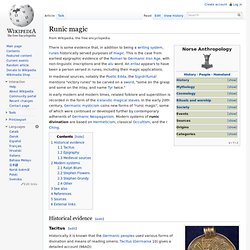
" In early modern and modern times, related folklore and superstition is recorded in the form of the Icelandic magical staves. In the early 20th century, Germanic mysticism coins new forms of "runic magic", some of which were continued or developed further by contemporary adherents of Germanic Neopaganism. Modern systems of runic divination are based on Hermeticism, classical Occultism, and the I Ching.
Historical evidence[edit] Tacitus[edit] They attach the highest importance to the taking of auspices and casting lots. It is often debated whether "signs" refers specifically to runes or to other marks; both interpretations are plausible and Tacitus does not give enough detail for a definite decision to be made.[2] Judika Illes. Judika Illes is an American author of esoteric non-fiction books, aromatherapist and tarot reader.

Judika Illes (2009) Early life[edit] She is of Hungarian background and attributes a childhood spent in the culturally diverse Queens borough of New York City as a significant influence on her writing career.[1][2] Illes explains that her interest in divination began while playing with a Tarot deck at the age of six.[3] Her first Tarot deck was the Builders of the Adytum (BOTA) deck, which she described in a 2005 interview as "formidable and very esoteric," an unusual starter for a child of her age.[3] Magic (paranormal) Magic or sorcery is an attempt to understand, experience and influence the world using rituals, symbols, actions, gestures and language.[1][2][3][4] Modern Western magicians generally state magic's primary purpose to be personal spiritual growth.[5] Modern theories of magic may see it as the result of a universal sympathy where some act can produce a result somewhere else, or as a collaboration with spirits who cause the effect.[6]
